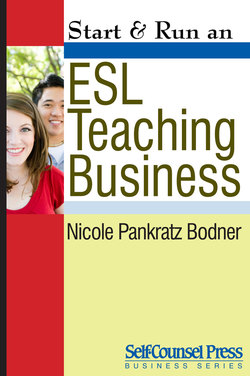Читать книгу Start & Run an ESL Teaching Business - T. Nicole Pankratz - Bodner - Страница 38
На сайте Литреса книга снята с продажи.
Program options for adult international students
ОглавлениеIf your primary market is adult international students, you might offer a range of content-based and student-led academic and social programs. Students with specific academic goals in mind could opt for a tutor who specializes in a popular academic area (e.g., Academic Preparation, TOEFL, Essay Writing), while students interested in business could choose a TOEIC or Business English tutor. For those needing help with everyday English communication, there could be tutors in everyday conversation, idioms and slang, or even a combination of the above.
There are numerous books and resources available to tutors working with academic students. For test-based programs such as the TOEFL, tutors may simply follow a tried-and-true textbook that includes practice tests and audio CDs. Or they may use textbooks and learning materials that have grammar and vocabulary-building exercises, taped news segments for listening practice, or other helpful materials that will prepare students for the reading comprehension section of the TOEFL.
For students interested only in improving their conversation skills, you could offer both one-on-one and small-group conversation tutorials.
Another way to tutor adult international students is to use the project-based system described above in the section on programs for young international students attending public schools. Once you get to know a bit about a student, you can plan a project that reflects their goals and interests. For example, I once tutored a student who was fascinated by Western kitchen gadgets and was hoping to find a job in an English-speaking restaurant. For her program we decided to devote a month to a research project that required her to learn and use cooking-related words and expressions. We created surveys that she used to interview a range of local people including staff at kitchenware stores and adults who loved cooking. She also researched kitchenware products online. In the end, she collated her data and used it to produce a ten-page report of her findings. By the time she finished her project, she said she was comfortable both using a new set of vocabulary words and starting conversations with strangers.
Another student wanted to improve her English so that she could better serve English-speaking patrons at her sushi restaurant back in Japan. For her project, we created English menus, signs, and an operations manual for a fictional English version of her restaurant.
Another student dreamed of becoming an English-speaking tour guide in her country. She wanted to learn tourism-related vocabulary and develop her pronunciation skills. For her project we pretended we ran a tourism outfit and created a brochure based on Internet and in-person research of local hotels, restaurants, museums, shopping malls, and other tourist attractions. For pronunciation practice, we taped her as she read the brochure aloud and asked native English speakers to listen to the tape to see if they could understand what she was saying. We practiced the phrases she had trouble with until she was able to produce a tape that was understood clearly by English speakers.
For adult students who want to practice speaking to native English speakers, here are some other project ideas:
• Adventure diary: Prepare the student to visit a range of local venues — a museum, a video store, an art gallery — by practicing words and even potential conversations he or she might have with staff or customers. Suggest he or she take a camera along to take pictures of what he or she sees and, if possible, the people he or she meets. Then, work with the student to create one-page summaries of the mini-adventures. Finally, collect and package the summaries into a book.
• Job hunt: Teach the student employment-related terms and issues by perusing job advertisements and helping him or her to create a résumé. Prepare him or her to talk about qualifications through mock job interviews. Encourage him or her to use these new skills in a real-life setting by applying for a real job in person or online, or by simply talking to people about skills and work history.
